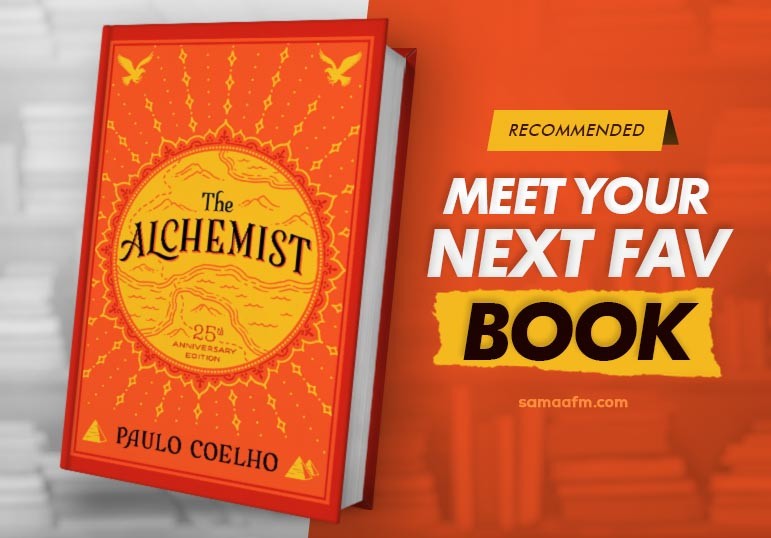
Book Review: The Alchemist By Paulo Coelho
- posted by: Abdul Latif Dadabhouy
- No Comments
Paulo Coelho was born on August 24, 1947, in Rio de Janeiro, Brazil. Coelho attended Jesuit schools and was raised by devout Catholic parents. He wrote song lyrics for Brazilian musicians protesting the country’s military rule. He was jailed three times for his political activism and subjected to torture in prison. Coelho’s most famous novel, The Alchemist, was published in 1988. It was his third book, following an unsuccessful first book Hell Archives (1982), and a nonfiction account of his spiritual awakening on the Camino de Santiago, The Pilgrimage (1986). The writing style, dialogues, and character plot are so eminent and well portrayed.

The Book In Review
Beginning
In The Alchemist, Santiago, the novel’s central character, is introduced as a shepherd and the writer quickly connects him with multiple dimensions. Santiago’s observation of sheep and realization about the adoption of their schedule is important, as the novel underscores awareness of the natural entities. Santiago lives a simple life and has simple desires; loves his sheep, and also likes a young woman. Later on, he will abandon his sheep and that girl too in order to pursue his personal legend. Santiago was attracted by the merchant’s daughter because she was impressed by his reading skills and storytelling ability.
Santiago used to travel constantly as his profession demands traveling with sheep, Santiago relishes his freedom, but sometimes, he also wants to settle down. Santiago identifies universal nature in his lifestyle that every wanderer wishes to settle down with other persons. Santiago’s thoughts about his responsibility for the sheep, the simple creature while Santiago will leave them because of his complex time. Santiago sought fulfillment through traveling. Coelho seems to prefer this sort of spiritual journey over simply following an identified path. Santiago’s discussion with his father is basically Coelho’s presentation of the two arguments for traveling versus finding a home and staying there. He will conclude that his village is truly where he belongs and also the most attractive and beautiful place. His father supports his idea of traveling and asks him to become a shepherd.
A Traveller’s dream?
Santiago felt that it was also his father’s dream as he himself wished him to travel and vicariously. Santiago’s traveling experience gave him spiritual guidance. He feels like he would not have been discovered God if he had not pursued his dream. Santiago learns meaningful lessons by observing his sheep and comparing them with humans who follow the monotony of life but do not think about the wider picture.
Life-changing patterns
Santiago seeks out the fortune teller to get to know the meaning of the recurring dream he had. He feels nervous around the fortune teller but gets easy by evidence of her Christianity. Santiago’s own faith is doubtful but he believes in God and the omens God gives him throughout the novel. Santiago is clearly a spiritual individual pursuing Christianity. The fortune-teller distinguishes between dreams that God shares in “our language and “language of the soul.”
The idea of the Soul of the World, a connection between all people and things that everybody can understand. The fortune teller’s interpretation of the dream provides no new insight into the quest. In the context of this novel, dreams often reveal important information about life. Santiago becomes irritated that the consultation with a professional added nothing new to his own information. There he identifies the factor of simplicity which will be later get related to the alchemist. The old man, king of Salem, met him anonymously and interpreted his dream, and led him towards the importance of personal legend. When that old man says to him that he has much more potential than being a shepherd, Santiago compares the fortune teller and this old man having the spiritual tendency. Here, Santiago gets confused that either he should stay with sheep or pursue his dream; a risk that everyone faces while taking a decision.
The old man gives strong evidence about his mysterious existence when his breastplate gets unrevealed. He gives two stones Urim and Thummim as an aid to help him in taking better decisions. He took them and went to Morocco in order to pave his way to the pyramids. Here, he meets an Englishman, and trusts him as a friend, handed over all his wealth to him and he appears to be a thief who robbed him in just seconds. At that moment, he caught attention towards stones and become comfortable but when those stones drop down from the hole of the bag, he started thinking that he should not rely on things, he should take his decisions himself. The next morning, when he wakes up, the candy seller gives him a candy ignoring the language barrier. He identifies a language that does not require words. On his way to Egypt, he passes by a crystal merchant who gave him the job and it’s the time when he again decides to give up his dream and should go back home. But then he decided to join a caravan leading Egypt.
Santiago finds love
When they finally arrive at the Al-Fayoum oasis – the home of the titular Alchemist; Santiago meets a beautiful girl named Fatima with whom he immediately falls in love. He soon discovers that love, like the Personal Legend, comes directly from the Soul of the World. While walking in the desert, Santiago has a vision of an upcoming battle. He rushes back to warn the elders at the oasis. The next day, 500 armed tribesmen enter the oasis as Santiago has predicted. The men, duly warned, kill all of the intruders. The chieftain of the oasis awards Santiago 50 pieces of gold and offers him a position as a counselor. Santiago considers staying at the oasis with his newfound love Fatima, instead of seeking the Pyramids. Fatima, however, tells Santiago that she understands his need to realize his goal. The women of the desert, she explains, are proud of their men’s freedom. This confuses Santiago, who is unable to separate love and possession.

The Alchemist Ending
The Alchemist finds Santiago and tells him that he will lead him to his treasure. While on the move, the Alchemist teaches Santiago that hearts can be treacherous, but the best way to keep them from fooling you is to listen to them intently, one must listen to the Soul of the world to find one’s treasure. Everything on earth, even minerals, has a Personal Legend. This is why alchemists can change any metal into gold; they are simply helping the metal achieve its Personal Legend. When the two travelers are taken prisoner by a warring tribe, the Alchemist in an effort to save their lives claims that Santiago is a magician who can turn himself into the wind. Santiago has no idea what he is doing but eventually starts to pray with acknowledgment that his heart and the Soul of the World are one. Immediately, the wind whips up, and Santiago disappears and reappears on the other side of the camp. The tribal chiefs are so impressed that they let the travelers go. The next day, the men arrive at a monastery. The Alchemist uses his piece of the Philosopher’s Stone to turn lead into a quantity of gold and some to Santiago and some to a monk. Santiago continues on to the Pyramids alone. There, he is overwhelmed with joy realizing he can turn back now that the real treasure is not gold or jewels, but the wisdom he has gained from his journey and his love for Fatima. His heart tells him to dig in a spot where he sees a scarab beetle. It’s the time when Santiago has learned lessons in a defined order; omen which he had saw. End suggests that Santiago will come to Fatima and Fatima also had waited long for him because their love is true. Santiago has learned many lessons and also had got the treasure. He can live happily forever.
Lessons
We have got some morals which are so meaningful. Firstly, the thing is if you do something faithfully with best efforts, it would obviously go great, so do everything with a pure heart. Secondly, if you do not achieve your target at once, give it another chance, do not give up too easily. Thirdly, it does not matter what you are doing but it’s very important to know that every single person is contributing to the world’s history so try to do great things for a great change. Lastly. Do not take simplicity as an ordinary matter. Simplicity is extraordinarily extraordinary and also the real beauty of the world.
So, do not let down your dreams and personal legend, fear of loss and thrashings, disruptions, already programmed inner mind, dreams and the instincts, your dream for your life, luck is a Karma, a myth.
RECOMMENDED BOOKS
If you like this Book review you can also check these
– BOOK REVIEW: THE LOST SYMBOL BY DAN BROWN




